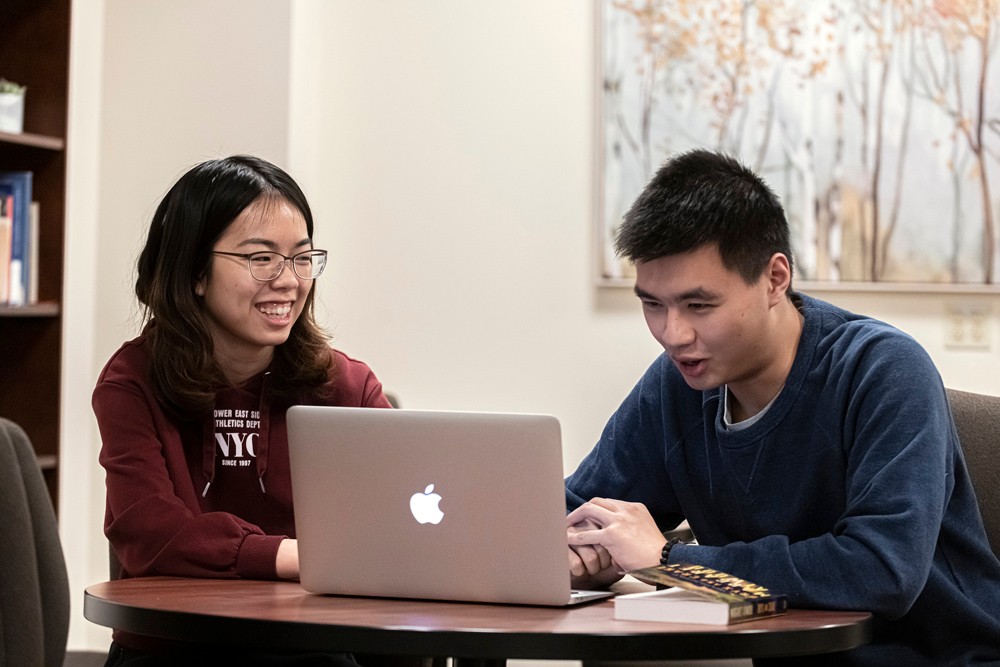Photos by Lee Pellegrini
The Boston College Writing Center, a peer academic assistance resource launched by the English Department last semester, provides valuable support for undergraduates across the University, in all BC schools and disciplines—and it’s getting great reviews.
According to center administrators, student users—who are asked to provide comment via online surveys—have been overwhelmingly positive: Every respondent affirmed that they would schedule another session and recommend the center to a friend.

Writing specialist Weitao Liu '20 provides some assistance at the center to Yitang Liu '21.
English Chair and Professor Amy Boesky said the department developed “a program to train talented majors to work with peers on their writing,” drawing on a one-credit course, The Art of Tutoring, taught by Associate Professor Paula Mathieu, who co-leads the center with English Language Learning (ELL) Director Lynne Anderson and Writing Fellows Program Director Marla DeRosa. “Still in a pilot phase, the center has tremendous value for the students training as specialists; they learn skills they can apply down the road as writers or educators,” said Boesky.
Equally important, they use their skills to work one-on-one with fellow students, administrators said.
“We hope the Writing Center becomes an important resource across the University, and are grateful for the support of the Morrissey College,” said Boesky.
Anderson emphasizes that “it is strictly a writing center; we do not offer the extensive services that Connors Family Learning Center has done so well for years—for example, tutoring in all subject areas.”
“Our writing specialists offer support during all stages of the writing process—from brainstorming to drafting to revising to editing. Students who visit the center work with peers, many of whom have taken similar classes and worked on similar assignments,” she said.
Located in Stokes 418S, the center has seen significant student traffic since its October opening, with nearly 150 appointments, freshmen constituting the highest number.
The majority of these students, whose subject areas have included literature, history, philosophy, law, and political science, felt their sessions not only helped them improve a particular paper, but developed their capabilities as writers.
One student praised her writing specialist: “She was good at allowing me to get my point across in my own words without influencing it. I had the ideas, but she helped me sort them out.”
“We are thrilled to hear comments like this because one of our key goals is to help students become better writers,” DeRosa said.
“It is very important for BC to offer this resource because of the unique challenges that students face when undertaking the increasingly complex and demanding work of undergraduates at such a rigorous institution,” said writing specialist Nimrita Singh ’20, who has had more than 20 appointments with both ELL and non-ELL peers. “Every student needs to know how to communicate their ideas clearly and effectively. I believe that having a center dedicated to facilitating this capability is crucial in BC’s mission to care for the whole individual.”
Mathieu calls working with Singh and the nine other writing specialists—several of whom have taken ELL linguistic training with Anderson to enable them to support bilingual students—“a joy and honor. Our [training] course focused on interpersonal skills needed to help put a student at ease: to be encouraging, ask generative questions, listen mindfully, and to help the student learn and practice some tools of drafting, organizing, revising, and editing.”
“We are heartened by the consistent and growing student interest and visits to our new Writing Center. Our goal of encouraging writers and helping them strategize more effective processes is resonating with BC students.”
More information is available at the BC Writing Center website.
Rosanne Pellegrini | University Communications



